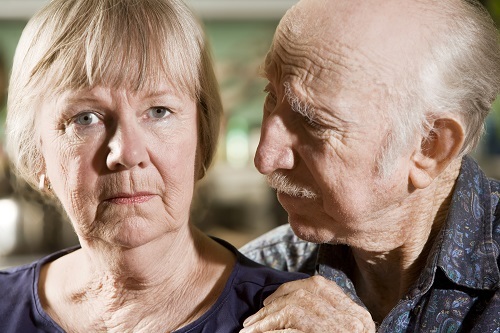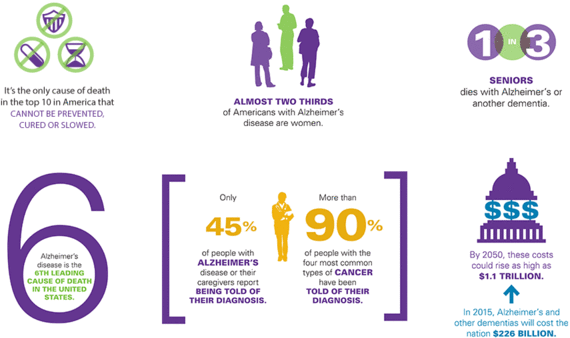Alzheimer's is taking its toll on the global population, and the statistics are startling. How many people worldwide have Alzheimer's? Amazingly more than 44 million individuals worldwide have Alzheimer's, with Western Europe and the United States (US) providing the bulk of the cases.
Within the US, 1-in-60 of adults in the US will be diagnosed with Alzheimer's disease during our lifetime. Today, 5.3 million Americans are living with Alzheimer's disease, and may expect to have on average 4-to-8 years of life post diagnosis. According to the Alzheimer's Association 1-in-9 Americans over 65 has Alzheimer's disease. The projection is by 2031 more than three million people over the age of 85 will have Alzheimer's (approximately one-third of the over-85 population).
"There has never been a patient who has recovered from Alzheimer's"
No one is immune
The faces of those who have experienced Alzheimer's are detailed on the cover of the AARP January/February 2015 edition of their bulletin. In the article Where is the war on Alzheimer's, the harsh realities surrounding Alzheimer's is revealed. It is important to remember, "There has never been a patient who has recovered from Alzheimer's," said Robert Egge of the Alzheimer's Association. The AARP claxon call for increased funding for research is constant and consistent. The faces of those who experienced Alzheimer's are many, and they include the most privileged to the least privileged. Alzheimer's does not discriminate.
Diagnosis
As we age it is not uncommon to forget a name or a number. And it is only natural to ask the question, "When do I begin to worry about memory loss?". In doing so, we may find ourselves engaging in a good bit of self-diagnosis. It is important to remember there are a number of different types of memory loss and dementia, which may not be associated with Alzheimer's.
The most common form of progressive dementia is Alzheimer's disease. Researchers estimate that Alzheimer's accounts for about 60 percent of all cases of dementia. The second most common cause of dementia is a stroke (including a TIA, transiet ischemtic attack); this is called vascular dementia. It is equally important, that should you suspect Alzheimer's that you seek the opinion of your medical provider. Should the diagnosis be positive for Alzheimer's try and determine at which stage of Alzheimer's you are currently experiencing. Alzheimer's worsens over time, knowing where you are in the journey, will allow you to determine your next steps post Alzheimer's diagnosis.
Once diagnosed, engage in meaningful planning
Have a plan
The Alzheimer's Foundation recommends that once diagnosed, you engage in meaningful planning. This planning should include talking to your adult children about your Alzheimer's and the care you wish to receive. Reaching out to your family attorney to ensure your advanced directives and last will and testament are in order. Identifying a financial fiduciary or financial backup person. And ensuring all concerned know of and how to access your personal digital legacy of photo archives, social network accounts, and personal emails. While there is no cure for Alzheimer's, an early diagnosis allows you to take control for as long as possible, and as the years progress.
----------
-----
This article by Christopher Burgess is adapted and crossposted from the Red Folder blog with permission.


